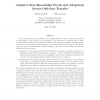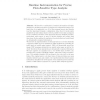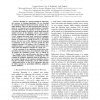217 search results - page 42 / 44 » Some Thoughts on Using Computers to Teach Argumentation |
TCC
2009
Springer
16 years 7 days ago
2009
Springer
In the setting of secure computation, a set of parties wish to securely compute some function of their inputs, in the presence of an adversary. The adversary in question may be st...
103
click to vote
RV
2010
Springer
14 years 10 months ago
2010
Springer
We describe a combination of runtime information and static analysis for checking properties of complex and configurable systems. The basic idea of our approach is to 1) let the p...
ICS
2010
Tsinghua U.
15 years 9 months ago
2010
Tsinghua U.
We introduce the notion of "non-malleable codes" which relaxes the notion of error-correction and errordetection. Informally, a code is non-malleable if the message cont...
SAC
2004
ACM
15 years 5 months ago
2004
ACM
This paper describes wildcards, a new language construct designed to increase the flexibility of object-oriented type systems with parameterized classes. Based on the notion of v...
159
click to vote
FOCS
2010
IEEE
14 years 9 months ago
2010
IEEE
Boosting is a general method for improving the accuracy of learning algorithms. We use boosting to construct improved privacy-preserving synopses of an input database. These are da...



